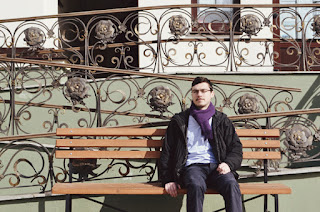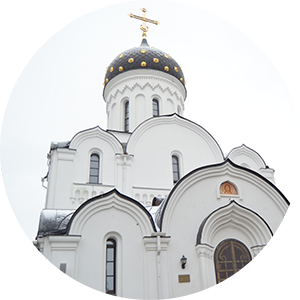There are 197 states in the world today.
Information about each of them is readily available at the click of a
mouse button. However, reading is one thing and listening to a person who lives
in that country is another thing. More often than not, information you get from
these two sources will be different.
As I was getting ready for my interview with Mihai Gavrilă, our guest
from Romania, I read that there is a tradition in many Romanian monasteries to
weave carpets because people always kneel for prayer and therefore, church
floors are covered with carpets.
Mihai smiled, «No, no, not necessarily. However, people don't kiss the
Chalice after communion, unlike people in Belarus. Our choirs use Byzantine
chant. There is a different chant in your Convent, and it is beautiful. I could
comprehend many prayers».
Our guest told me that people in Romania bake cakes not only for Pascha
but also for Dormition and the Nativity of Christ. Interestingly enough, the
Romanian Church adopted the Gregorian calendar but they celebrate Pascha on the
same day that we do.
I read that Romanians honour
their customs and often wear traditional clothes.
 There are few families nowadays who have preserved the traditional
clothes that our ancestors wore. People tend to think that these clothes are of
no use anymore. Nowadays, traditional clothes are made by machines not people.
There is no warmth of human hands in them. With that said, people do their best
to wear traditional clothes on Pascha and Nativity.
There are few families nowadays who have preserved the traditional
clothes that our ancestors wore. People tend to think that these clothes are of
no use anymore. Nowadays, traditional clothes are made by machines not people.
There is no warmth of human hands in them. With that said, people do their best
to wear traditional clothes on Pascha and Nativity.
Mihai, how did you
learn about our Convent? Why did you decide to come here?
A friend of mine came to your convent last year to improve his metal
worker's skills. I followed into his footsteps.
I spent a lot of time working in an office behind closed doors, with
artificial light and in front of a computer screen. At a certain point, I
realised that you cannot speak of spiritual life under these conditions: you
are isolated and you never see the results of your effort. In addition, money
cannot be the ultimate goal in and of itself. Money becomes the purpose in life
for many people. They focus on working in an office, being a white-collar
employee, and earning more and more money.
On the contrary, I wanted to see the results of my own labour. An icon
painter will see the icon he painted, a metal worker will see the cross he made
but what will I see?
So my spiritual father asked me, «Would you like to learn a craft»?
 During my stay at the Convent, I managed to visit the rehabilitation
centre, to see mosaic artists work but I did not have the opportunity to take
part in the creative process.
During my stay at the Convent, I managed to visit the rehabilitation
centre, to see mosaic artists work but I did not have the opportunity to take
part in the creative process.
You were upset, weren't you?
I came here following God's will. Why would I be upset? I found new
friends to drink tea and to attend Liturgies and the boarding home with. This
is a valuable experience for me because I used to visit nursing homes in
Romania. The one most essential thing for me here is divine worship and
prayers.
Mihai, you came to Belarus not
from Romania but from Belgium, didn't you? What do you have in common with this
country?
It was an Erasmus university exchange that helped me to go to Belgium
for the first time in 2011. Later, I returned to Romania, graduated from a
university and then went back to Belgium thanks to another exchange programme.
 My first spiritual father in Romania recommended another spiritual
father in Belgium to me. Currently, Father Ciprian is my spiritual father.
There are 150-200 members in our community. These people have become my second
family — a spiritual one. Romanians who are scattered around Belgium come to
our church dedicated to All Saints in the centre of Belgium for the Divine
Liturgy on Sundays and feasts, for conferences on spiritual topics and for
personal events (to get matried, baptised, etc.). In fact, we live as a
community, meeting in total several times per week plus community pilgrimages.
This is a community because people who wanted more prayer (Romanians attending
a big cathedral in Brussels mostly) found themselves organised around a
spiritual father (Fr Ciprian) who led this small flock to organise itself now
in one of the more vibrant Orthodox communities in the Western Europe. People
were united around their need for prayer and a spiritual father with the will
for building a strong community who led us towards this against all odds. God
provided a place for us, too: our church dedicated to All Saints is our «home»
in Belgium.
My first spiritual father in Romania recommended another spiritual
father in Belgium to me. Currently, Father Ciprian is my spiritual father.
There are 150-200 members in our community. These people have become my second
family — a spiritual one. Romanians who are scattered around Belgium come to
our church dedicated to All Saints in the centre of Belgium for the Divine
Liturgy on Sundays and feasts, for conferences on spiritual topics and for
personal events (to get matried, baptised, etc.). In fact, we live as a
community, meeting in total several times per week plus community pilgrimages.
This is a community because people who wanted more prayer (Romanians attending
a big cathedral in Brussels mostly) found themselves organised around a
spiritual father (Fr Ciprian) who led this small flock to organise itself now
in one of the more vibrant Orthodox communities in the Western Europe. People
were united around their need for prayer and a spiritual father with the will
for building a strong community who led us towards this against all odds. God
provided a place for us, too: our church dedicated to All Saints is our «home»
in Belgium. |
| Click here to see full timeline |
Sometimes you can see Orthodox churches within a walking distance from
each other in Romania but I never felt how crucial it was before I went abroad.
We have so many churches, so many opportunities, that people often do not
appreciate enough. Being able to go to church is a great opportunity and a true
God’s miracle. When you travel abroad, when you see what happens in the West
when people don't believe in anything, when they wander astray, when they do
strange things, you begin to see what is really important.
So you live in Romania and travel
to Belgium for confession? Is that right?
Yes, I go to Belgium about five times a year. Anyway, I maintain a close
relationship with Fr Ciprian and I can call him at any time, because a
spiritual father is the person who assumes you and you assume him in the sense
that he suffers the pains of your spiritual birth. You can confess in any
church — there are many priests — but I can submit my spiritual well-being only
into the hands of my spiritual father. I pray for my spiritual father and I
know that he prays for me.
I would like to tell you about our tradition — the Candlelight Prayer.
Our spiritual father in Belgium suggested that we, his spiritual children and
members of that community, take turns praying for each other and for the world.
We constantly pray for people who need help.
Prisoners in Pitești practised this kind of prayer in late 1950s and our
spiritual father was moved by this and proposed it to us. They took turns
praying in their cells. Prisoners in other penal facilities across the country
adopted this innovation. Later, quite a few of these prisoners were martyred
and became victims of the violent attempt of Communist government at their
«re-education». Currently, these candlelight prayers started not only in
Romania but also around the whole world (Europe, USA, Canada, and even in
Japan).
Elder Ephraim from Vatopedi Monastery on Mt Athos blessed a translation
of the Candlelight Prayer into many languages, so that people from around the
world could join this prayer.
We have launched a website devoted to this prayer
http://www.candelar.ro/en/. I hope that this prayer for the entire world will
sound in your country, too.
Your story is amazing and
noteworthy. I hope that this prayer for the entire world will sound in all
languages. Let's get back to your home country. Can you tell us about your
people? What is it that makes you love your country?
Yes, economically speaking, it is hard to live in Romania. Media have
tried to convince us that Romania isn't a country you would want to live in and
that Western Europe is a paradise. However, when you go there, you realise that
things aren't as good as they were advertised to be. I would like my children
to live in Romania.
A friend of mine says, «You can't stop being a Romanian as long as you
are alive».
You have ancestors and you live on their land, so you have to pray for
them.
If everyone suddenly decides to get rich and leave the country, who will
remain here and continue to pray for our ancestors? Who will pray for me when I
die? Who will pray for me not only during my lifetime, but also in the
afterlife?
A pious but not yet canonised priest used to say that you would be
judged on Judgement Day not just as a human being but also as a representative
of your nation. You cannot separate yourself from your past and from your
nation.
By Vadim Yanchuk
















CONVERSATION